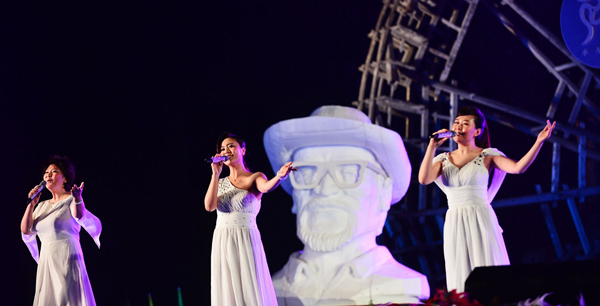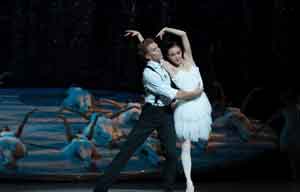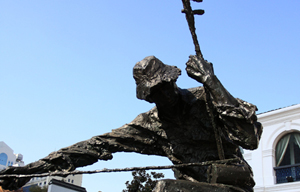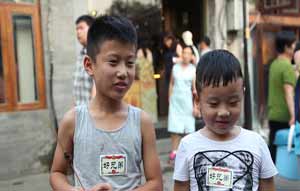Concert inspired by crescent moon
Updated: 2013-06-21 13:45
By Sun Yuanqing (China Daily)
|
||||||||
 |
|
The folk music concert in Qinghai features popular Chinese girl band Black Duck. Wu Gang / Xinhua |
Qinghai's folk music Hua'er is not generally well known but most Chinese people are familiar with the music of Wang Luobin (1913-96), who was inspired by Hua'er.
To commemorate Wang's 100th birthday and Hua'er, an outdoor concert dedicated to both was held on the banks of the Yellow River in Guide county, Qinghai province, on June 17. Despite the pouring rain, people waited for hours to attend the sixth annual Qinghai Concert for Water and Life.
"The Yellow River bred Hua'er, which inspired Wang to write his classic pieces. By playing Wang's music beside the river, we also want to raise people's awareness of protecting the Yellow River and water resources," says Jidi Majia, poet and head of the Qinghai publicity department.
Wang lived in Qinghai for more than a decade in the 1930s and 1940s, during which he wrote some of his best-known pieces, including At a Faraway Place and The Crescent Moon Rises.
The concert featured popular Chinese girl band Black Duck, local Hua'er singer Ma Quan and Nigerian singer Uwechue Emmanuel, also known by his stage name Hao Ge in China.
Despite altitude sickness, Emmanuel performed Wang's The Crescent Moon Rises and his own work Eastern Girls.
Known for his adaptations of Chinese folk music with Western and African influences like R&B, Emmanuel says it's time for Hua'er to attract bigger audiences.
"Like Peking Opera, Hua'er should strive to set a trend of its own in the context of modern music. I will also look for opportunities to mix it in my own work," Emmanuel says.
Ma Quan, a disciple of Ma Jun, the most famous Hua'er singer alive, performed an original Qinghai Hua'er song, Huanghuajie Ling. "Compared to my teachers, I have added more influences from modern music and northwestern China so that younger audiences can understand it better," says Ma, 25.
Hua'er is often sung in the rural areas of northwestern China, while in Qinghai it is sung by eight ethnic groups including Tibetan, Mongolian, Salar and Han people.
An antiphonal singing that improvises love lyrics, Hua'er was not considered appropriate to be performed in public until Wang presented it in a modern musical language.
For locals, Hua'er is more than just music, it is a way of celebrating their own culture.
Ma Yuhua, a Hui woman who sells homemade yogurt on the banks of the Yellow River, says she takes her family to the concert every year. "This is a chance for us to hear the best Hua'er singing," she says.
For young people, Hua'er is becoming increasingly distant, but that doesn't stop them from enjoying the music.
"I don't really understand the lyrics, but hearing the melody with the roaring of the Yellow River somehow makes me feel calm," says Quncuo Zhuoma, a 26-year-old Tibetan woman.
| Modern 'Swan Lake' ballet rehearsed in Australia | A lost soul in a time of turmoil |

 Victoria Beckham S/S 2014 presented during NYFW
Victoria Beckham S/S 2014 presented during NYFW
 'Despicable' minions upset Depp's 'Lone Ranger' at box office
'Despicable' minions upset Depp's 'Lone Ranger' at box office
 'Taken 2' grabs movie box office crown
'Taken 2' grabs movie box office crown
 Rihanna's 'Diamonds' tops UK pop chart
Rihanna's 'Diamonds' tops UK pop chart
 Fans get look at vintage Rolling Stones
Fans get look at vintage Rolling Stones
 Celebrities attend Power of Women event
Celebrities attend Power of Women event
 Ang Lee breaks 'every rule' to make unlikely new Life of Pi film
Ang Lee breaks 'every rule' to make unlikely new Life of Pi film
 Rihanna almost thrown out of nightclub
Rihanna almost thrown out of nightclub
Most Viewed
Editor's Picks

|

|

|

|

|

|
Today's Top News
Going green can make good money sense
Senate leader 'confident' fiscal crisis can be averted
China's Sept CPI rose 3.1%
No new findings over Arafat's death: official
Detained US citizen dies in Egypt
Investment week kicks off in Dallas
Chinese firm joins UK airport enterprise
Trending news across China
US Weekly

|

|









